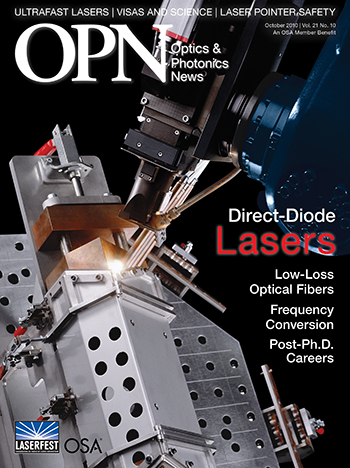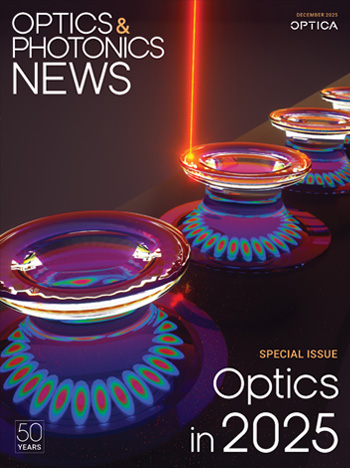
October 2010 Issue
Feature Articles
High-Power, High-Brightness Direct-Diode Lasers
This is the century of the diode laser. These authors describe how direct-diode lasers are entering the high-power laser market, enabling materials-processing applications such as welding, soldering and cutting.
by Stephan Strohmaier, Christoph Tillkorn, Peter Olschowsky and John HostetlerMaking the First Low-Loss Optical Fibers
Thirty years before the laser was invented, researchers laid the groundwork for another huge breakthrough in optics—the development of low-loss fiber for communications.
by Peter C. SchultzBroadband Nonlinear Frequency Conversion
Researchers are working to develop new techniques for nonlinear frequency conversion as well as new crystal design structures to help meet this need. Their work is leading to applications in optical communications, metrology and other areas.
by Haim Suchowski, Barry D. Bruner, Ady Arie and Yaron SilberbergSo What Do I Do with a Ph.D., Anyway?
In this roundtable discussion, three young professionals with a background in optics talk with OPN about how they answered this important question for themselves.
by Michael M. Mielke, Alicia Jackson and Winnie YeDepartments and Columns
Thinking Beyond Academia in Your Job Search
Today’s math problem: If twelve physics graduate students are all being trained to take over one professorial position, what happens to the other eleven?
OPN Talks with Henry C. Kapteyn and Margaret M. Murnane
Our conversation with Henry C. Kapteyn and Margaret M. Murnane, ultrafast laser experts and Arthur L. Schawlow prize recipients.
A Red Light for Green Laser Pointers
Inexpensive green laser pointers can emit 20 mW of unspecified infrared radiation in addition to their green output. The problem derives from an unsafe design. This article describes a simple diagnostic method to identify hazardous pointers by using a digital camera, a Web camera, a remote control and a compact disc.
Interrogating Terahertz with Light
A new scheme developed by researchers encodes the phase and amplitude information of terahertz waves onto ultraviolet light that can be detected from a distance and from almost any angle.
Do We Need Visas for Science-Related Travel?
Scientists who must acquire visas to travel to technical conferences are often forced to cancel their plans due to procedural hassles and delays. As we look to promote international collaboration among researchers, the time may be right to consider other alternatives for science-related travel.
Diffraction, the Silk Handkerchief, and a Forgotten Founder
Between signing the Declaration of Independence, composing opera, and helping to design the U.S. flag, Francis Hopkinson also dabbled in optics—using his silk handkerchief to observe diffraction.
When Robert W. Wood journeyed across the pond in 1904, he wound up feeling right at home in the lab of another legendary optical physicist.
Deep-UV Laser Pulses Get Even Shorter
The Germany-based team known for its research into ultrashort light-pulse generation has pushed the record for the shortest deep-ultraviolet pulses below 3 fs.
Silicon On-Chip Amplifier Boosts Mid-IR
Researchers at Columbia University and IBM's Thomas J. Watson Research Center built an optical parametric amplifier (OPA) on a single silicon chip.
Triple-Slit Experiment Has Quantum Implications
A century after it was first used to probe the duality of waves and particles, a modified version of the double-slit experiment—using three slits—has placed a limit on the accuracy of one of the laws of quantum mechanics.
Also in this Issue
In Memory: Remembering OSA emeritus member John B.Abbiss and OSA Fellow Franco Cerrina.
Remembering OSA emeritus member John B.Abbiss and OSA Fellow Franco Cerrina.


![Manual probe system with needles for test of semiconductor on silicon wafer. [A. Morozov / Getty]](https://opnmedia.blob.core.windows.net/$web/opn/media/images/articles/2025/1125/departments/202511-cover-web.jpg?ext=.jpg)
![Researcher Clara Saraceno in the lab. [Image by Carsten Behler Photography]](https://opnmedia.blob.core.windows.net/$web/opn/media/images/articles/2025/1025/departments/202510-cover-web.jpg?ext=.jpg)
